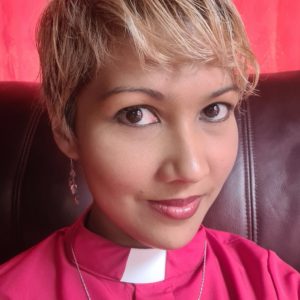“Vicarious Trauma” by Sanya Beharry
I recently learned the phrase “vicarious trauma”: the toll it takes on supporters of those who have experienced trauma, culminating from stories of years of suffering and abuse. Five years ago, the word “trauma” would not have been a regular part of my vocabulary, save perhaps for the odd medical drama or war veterans speaking about PTSD on television. Now, however, it seems to have become a regular and recurring terminology worldwide as we struggle through a pandemic of Covid-19 and waves of violence against girls and women.
As a newly ordained minister in October 2020, I was thrust into pastoral care among people I had never met before, and a multiplicity of stories started coming to light one by one. Molested by neighbours, stepfathers, and uncles as children. Abused by parents and in-laws. Verbal and physical abuse at the hands of partners. Sexual abuse couched as marital duty instead of marital rape. Pregnancies lost due to abusive husbands. Predators waiting to pounce on women in vulnerable financial positions. Spiritual abuse from relatives and “pastors” who encouraged them to stay in marriages and homes despite all of it. And the lingering trauma which hadn’t been addressed for years as persons were only now trying to come to terms with their past and present with no clue how the future will turn out.
They shared their deepest and darkest fears, often with disbelief that someone was actually listening and believed them. Many had never considered the situation from the perspective of justice and simply felt that this was their lot in life. Nothing would change. Nothing could change. Yet there was also a strong sense of faith from these women who learned to truly count on God as a provider in their lives and a God who deeply loved and cherished them.
From then to now, some situations have changed drastically, while others are still taking baby steps towards some form of resolution, and all still struggle daily with the trauma of these experiences. The intersectionality of the complex web of life that ties one to the other and each issue of justice together makes for great academic study but terrible consequences in life. Where on earth could a mother of five move to in order to keep herself and her children safe from a violent husband? Who could provide a safe space for a woman struggling to manage her own mental health, as her in-laws would constantly rip her to shreds and deliberately destabilize her, even as she fought to protect and care for her children? All of this amid a pandemic, resulting in income loss, housing challenges, food insecurity, and virtual home schooling, even as we face the very real threat of Covid-19 infections.
As for me, I felt so immersed in the unrelenting presence of gender-based violence and perpetrators who were very much still in the community and in our churches, that I struggled with my own sense of hope and paranoia as I wondered if there were truly decent and good people around, or if most people had this kind of hidden ability to inflict trauma. It also raised the spectre of some incidents in my own life that I’d never dealt with properly – not as “bad” as what I’ve described above, but enough to have registered and be uncovered for what it really was through the lens of gender justice and the experiences of others. Sufficed to say, I think I’ve started to experience some “vicarious trauma”.
However, the work of listening and presence, especially coming from a member of clergy, must continue. As Meister Eckhart would say: “The most important hour is always the present. The most significant person is precisely the one sitting across from you right now. The most necessary work is always love.” Clergy, elders, and church leaders overall, have a powerful ability to reach beyond the separation of public and private spheres of life, and directly influence the way in which families interact with each other. We can reach beyond the veils that people hide behind as they pretend to be good churchgoers and uncover truth. We are a people who serve a God who firmly stands on the side of the poor and oppressed. Our God is indeed one of Justice and whose Love for us is nothing like the fake love that keeps persons imprisoned in homes, situations, and relationships.
We must, therefore, learn how to deal with the trauma before us: (1) to be mindful of the lives and histories of the persons in our communities and congregations whose pasts and presents are filled with pain; (2) to be able to manage our own responses to that pain in a way that facilitates healing in the long run, and not just first aid band-aids; and (3) we must strive to ensure that we model the type of relationships and moreover what healthy love looks like through our beliefs, attitudes and behaviours as Church.
To some, the term “Trigger Warning” can seem like an unnecessary pandering to a “snowflake generation who need to toughen up”. I believe Trigger Warnings (TWs) are an act of love and care for our neighbours as we become more aware of the ways in which our people have suffered. Speaking prophetically with special care and inclusivity can only build our community. When we make such provisions for some, they benefit all.
When we are exposed to these stories of pain, it’s easy to want to jump on some kind of bandwagon and find instant solutions. Give them money. Convince the person to leave the home. Report the abuse to the police. But nothing is ever so easy or so swift. There are processes that take time and effort – both internal and external. We must be willing to play the long game, strategize and journey with others in ways that build them up for a hope and a future, not dependence on you or failure when aid runs out.
Churches also can be a place of abuse…. A place where the marginalized who should find sanctuary are instead turned away. But also in more subtle ways, as misogyny remains very much at play in decision making and even in the language of worship. It also exists in the ways we belittle and attack youth and young women, members of the LGBTQ community and those who challenge our traditions. Churches must have that reckoning to actively pursue non-violence within our own systems and behaviours – perhaps then we may be able to be a more active voice in society as a genuine source of Love.
I began this piece thinking about vicarious trauma and being somewhat happy at being able to name the phenomena I have been experienced, though it has been a negative experience. But I am also grateful everyday that these men and women have been able to find a safe place to share their sorrows and turn to God and God’s people as a source of comfort. I also can’t help but to think of Christ’s vicarious suffering on our behalf and if his trauma is anything close to that of the collective pain of the people crying out around us, how great indeed it must be!
Perhaps as we deal with the trauma and sorrow of the world, it will help each of us to draw nearer to our God of comfort as we all seek peace.
 Rev. Sanya Sita Beharry comes from a family who encouraged her pursuit of excellence while fully participating in the life of the Church from Sunday School to Eldership at her home church – Reform Presbyterian Church. She is a national scholarship winner from Naparima Girls’ High School; holds a BSc in Management Studies and International Relations from the University of the West Indies; and has worked in small business development with the government of Trinidad and Tobago.
Rev. Sanya Sita Beharry comes from a family who encouraged her pursuit of excellence while fully participating in the life of the Church from Sunday School to Eldership at her home church – Reform Presbyterian Church. She is a national scholarship winner from Naparima Girls’ High School; holds a BSc in Management Studies and International Relations from the University of the West Indies; and has worked in small business development with the government of Trinidad and Tobago.
After a few years in the secular world, she followed the call of Christ into the ministry of Word and Sacrament. Committed to ecumenism, inclusivity, true worship, internationalism and justice for all creation, Rev Sanya has studied and worked in various parts of the world as she learned more about what it means to be a child of God. She served as the Caribbean Young Adult Representative for CANACOM- the Caribbean and North America Council for Mission, assisted the Caribbean chapter of the Council for World Mission, served with the World Council of Churches in South Korea, and studied in Germany with the World Communion of Reformed Churches. She completed her Licentiate at the St Andrews Theological College in 2019 and was ordained on Reformation Sunday in 2020 during Covid-19 restrictions. She currently serves as the Minister of the Guaico Pastoral Region, Chairperson of the Northern Presbytery of the PCTT, and a producer on a weekly televised programme called “Moments of Inspiration”. In her ministry and life, Rev Sanya strives to inspire and support others to create a world where there is true justice and peace in all for all, based on the radical love of God.

